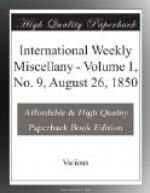For this reason we incline to be of opinion that Mr. Baillie is mistaken in thinking that a selection from the two books of the “Futawa Alumgeeree,” which embrace the subject of “sale” can have much utility for Indian practitioners. It does not follow, because a legal doctrine is declared sound in this work, that it is or ever has been practically applicable in India. As an authoritative declaration of legal doctrines, the book is as likely to mislead as to guide aright. On the other hand, as an exposition of the general principles of Mahometan law, even with regard to sale, it is necessarily imperfect. The work from which it is taken is a collection of legal opinions, which had in their day the force of judicial decisions—of something equivalent to the “responsa prudentum” of Roman jurisprudence. Each is expounded on its own merits; and all the special doctrines involved in it are laid down. Hence it comes, that much that is calculated to throw light on the principles of the law of sale must be sought under other heads; and that much included in the chapters ostensibly treating of sale refers to other topics. As part of an entire digest of the law compiled on the same principle as that of Justinian, the two books relating to sale are sufficient; but for an isolated treatise on “sale,” they contain at once too much and too little.
Nevertheless, we welcome Mr. Baillie’s publication as a valuable addition to juridical and even to general literature. The translation, though not by any means free from defects, is the best specimen of a really good Mahometan law-book that has yet been published. The defects to which we allude are twofold. In the first place, though Mr. Baillie mentions that in the original the name of the treatise from which it is taken is appended to every excerpt, he has not in his translation given those references. His work is not therefore what the original is, a Chrestomathia of the best Arabian jurists—a succedaneum for their complete works—an illustration of Arabic legal literature. Again, he is often loose and vacillating in the use of the English words he has selected as corresponding to the technical phraseology of the Arabian jurists, and sometimes infelicitous in the selection of his English terms. It has occurred to us that he would have succeeded better in rendering the exact meaning of his originals, had he availed himself more of technical phrases of the Roman law which are familiar to all European jurists. Is does not occur to us that he would by doing so have been in danger of Romanizing the Mahometan to an extent that might mislead. Mill, in his History of British India, has noticed how closely the classification of the Mahometan approaches to that of the Roman jurists. An attentive perusal of Mr. Baillie’s volume has convinced us that the analogy in the substance is quite as strong as in the arrangements. This fact seems susceptible of being accounted for on historical grounds. Mahometanism is in fact a sect or heresy




